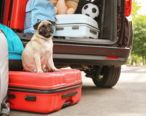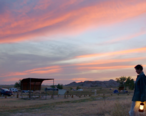6 Things to Consider If Debating Winter Travel
With the pandemic worsening and temperatures beginning to drop, those who typically seek winter respite in warmer climes are struggling to decide whether it’s safe and wise to do so this year. Whether you usually go south for months or days, it’s worth doing some extra research this year—especially if your age puts you at particular risk.

With the pandemic worsening and temperatures beginning to drop, those who typically seek winter respite in warmer climes are struggling to decide whether it’s safe and wise to do so this year. Whether you usually go south for months or days, it’s worth doing some extra research this year—especially if your age puts you at particular risk. Here are 6 factors to make part of your decision.
- Accomodations. Rental and real estate markets have been all shaken up by the pandemic, and you may have to adapt your budget accordingly. Maybe you’re used to easily finding renters to stay in your home all winter; maybe you’re used to renting a place for a particular price. There’s no guarantee things will be the same this season. Try putting your home on Airbnb, or browse the site to see what the rental market looks like in your destination. If you’re part of a timeshare, check in with the group to see if there are any changes to the protocols. Make sure your budget can accommodate any changes the pandemic has caused.
- Timing. When do you usually leave and come back? Given concerns about new outbreaks as winter sets in, it’s worth considering leaving earlier than usual, in case potential new travel restrictions are put into place. It will also be helpful to have flexibility on the return end, in the event that restrictions persist into the new year.
- Transportation. While flying was strongly discouraged early on in the pandemic, most recent research suggests that due to their air circulation systems, airplanes are actually not as dangerous as other places like grocery stores and restaurants. Rather, it’s airports that are the real concern, given that security lines and terminals can make social distancing a challenge. Avoid crowded areas and touching surfaces as much as possible, and wear a mask and sanitize throughout the journey. Booking flights months or even weeks in advance can also be risky, given the uncertainty about new outbreaks—though some airlines are allowing free cancellation should you need to change your plans. If it’s an option, consider driving, and sanitize after stopping at hotels or rest stops.
- Case count comparison. As always, some locations have far more cases than others. Provided you travel safely, it’s possible that going south will actually make you less likely to be exposed to COVID-19 than staying put—it all depends where you’re going and where you’re coming from. Keep an eye on the rates of infection in each place using this tool from the CDC, and also keep in mind that rates are highly subject to change.
- Access to healthcare. It’s essential that wherever you’re going, you have reliable access to healthcare. Will you be close to a hospital? Will you have a way of getting there? Do you have insurance that will apply? Make a contingency plan for what you would do if you have the misfortune of contracting COVID-19 symptoms while away. If you typically enjoy going somewhere remote, consider sticking closer to population centers where healthcare is more reliable.
- Quarantining. Will you be able to quarantine both before you go and after you come back, to be sure you don’t transport the virus? Will you be staying somewhere you can hole up inside for long periods of time in the event that a more serious shutdown ensues while you’re there? Some locations require or recommend not only that you quarantine before you visit and once you arrive, but also that you get COVID-tested shortly before you fly. Be sure that you follow the recommended protocols.














There are no comments for this article yet. Be the first to leave a comment